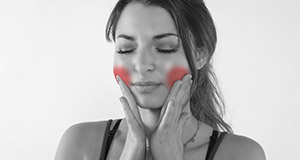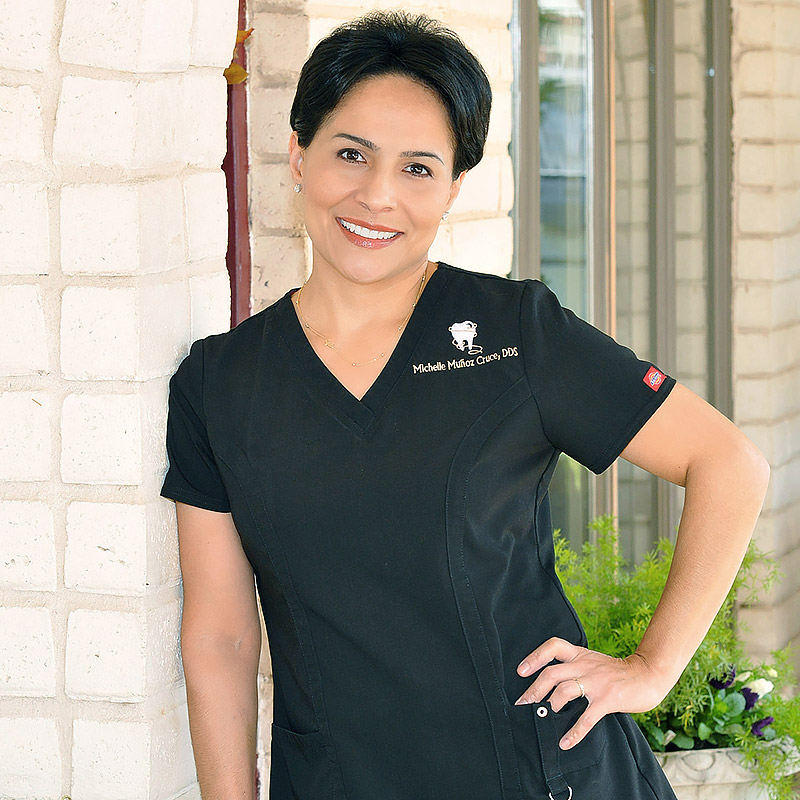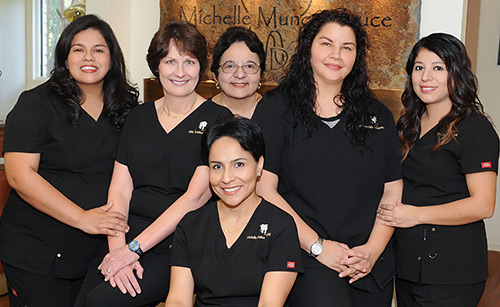Stop suffering from these symptoms of temporomandibular joint disorder, or TMD. The temporomandibular joint connects your lower jaw to your upper, allowing you to chew and speak. When the TMJ becomes inflamed, everyday functions like yawning, laughing, eating, or even speaking become painful. TMD can also cause headaches, earaches, neck pain, shoulder pain, and lock jaw. There is no need to suffer, though; Dr. Michelle Munoz can develop a treatment strategy that both helps manage your pain and treat your TMD.

The clicking, the popping, the headaches, the earaches…
Causes of TMD
Temporomandibular joint disorder can affect the muscles and connective tissue of the TMJ. Because there are so many components involved, TMD can be caused by a number of things. Whatever the cause — a sports injury, grinding your teeth, or arthritis — there are treatments available to restore your health.
How Treatment Can Help
TMD therapies vary according to cause and severity. They range from stretches to relieve muscle tension, cortisone shots, or customized oral appliances. Whichever treatment Dr. Munoz chooses, you can enjoy:
- Reduced pain
- No clicking or popping noises
- Free jaw movement
- No more head, ear, shoulder, or neck pains
The first step in seeking treatment is seeing Uvalde dentist, Dr. Michelle Munoz. Call today to schedule an appointment.
The temporomandibular joint connects your lower jaw to your upper. When there is a problem with this joint, it is known as TMD, or temporomandibular joint disorder. The inflammation associated with TMD can result in excruciating pain while performing basic functions, such as speaking and eating.
TMD can be caused by a number of things: a trauma from a car accident, clenching or grinding the teeth, bite misalignments, even arthritis, among others. Regardless of the cause, TMD can cause debilitating discomfort.
Get Help Now!

The temporomandibular joint connects your lower jaw to your upper. When there is a problem with this joint, it is known as TMD, or temporomandibular joint disorder. The inflammation associated with TMD can result in excruciating pain while performing basic functions, such as speaking and eating.
TMD can be caused by a number of things: a trauma from a car accident, clenching or grinding the teeth, bite misalignments, even arthritis, among others. Regardless of the cause, TMD can cause debilitating discomfort.
Get Help Now!
Symptoms of TMD

Clicking & Popping Sounds

Facial Swelling

Pain While Speaking, Eating and Yawning

Headaches, Ear Aches, Neck & Shoulder Pain
Symptoms like these may as well be associated with other conditions, making TMD potentially difficult to diagnose. Many sufferers report that their symptoms get worse during times of stress, leading to dizziness on top of their pains.
Good News! They can all be fixed.
How TMD affects the Nation
Americans suffer from TMJ Disorders.
of patients seeking treatment are female.
of people with a TMJ disorder will actually seek treatment.
lost work days are contributed to TMD annually.
* http://oralfacial.com/tmj-in-coral-springs-stats/
Living With the Pain of TMD:
1. Snacking
TMD makes eating painful. While friends and family enjoy hearty meals, TMD sufferers are limited to liquid and soft-food diets.
2. Conversation
Talking can be excruciating to those with TMD, making social interactions something to dread instead of occasions to look forward to.
3. Everyday Occurrences
Simple day-to-day tasks like brushing your teeth and involuntary movements like yawning can cause unbearable pain to those with TMD.
4. Working
Extreme cases of TMD can cause blurred vision and dizziness, interfering with sufferer’s ability to function at work or behind the wheel.
A word from the doctor
“A lot of people don’t realize how sleep deprived they are and how something as simple as an oral appliance can change their lives. Myself and my staff our committed and excited to help our patients find a pathway to a healthier and happier life.”
Michelle Munoz, DDS





